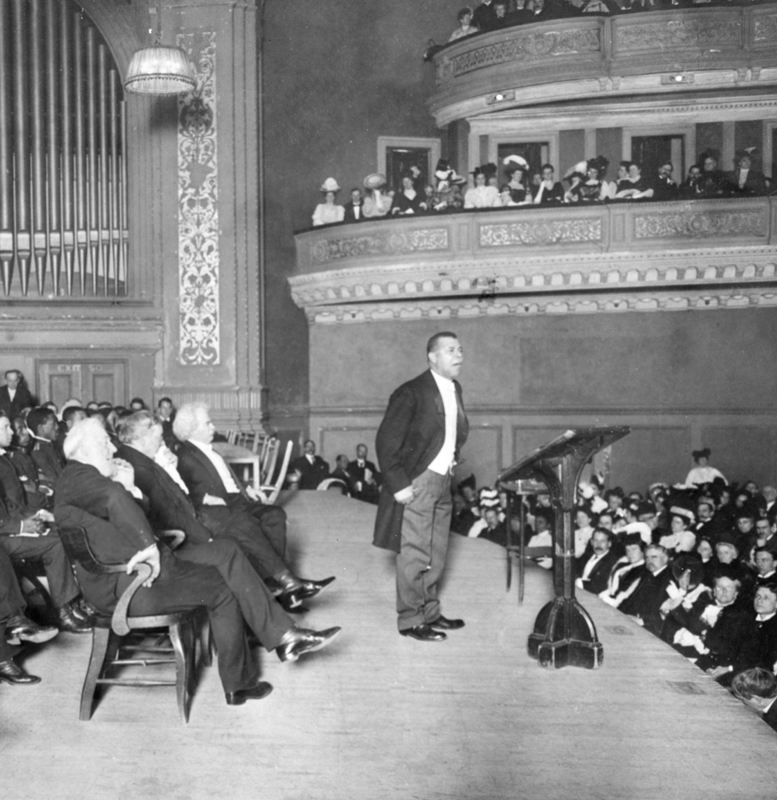
Like Frederick Douglass, he commented on the harmfulness of slavery in his autobiography:
The hurtful influences of the institution [of slavery] were not by any means confined to the Negro. This was fully illustrated by the life upon our own plantation. The whole machinery of slavery was so constructed as to cause labour, as a rule, to be looked upon as a badge of degradation, of inferiority. Hence labour was something that both races on the slave plantation sought to escape. The slave system on our place, in a large measure, took the spirit of self-reliance and self-help out of the white people.
Washington was a master of indirection.
The slave system similarly took the spirit of self-reliance and self-help out of the slaves. It was designed to be that way. Washington's task was to overcome the legacy of dependence and subservience. He understood even as a young boy that the official grant of freedom was not the same as the grant of equality.
Washington understood this as he observed Emancipation as a nine-year-old. Here is part of his description in Up from Slavery:
As the great day drew nearer, there was more singing in the slave quarters than usual. It was bolder, had more ring, and lasted later into the night. Most of the verses of the plantation songs had some reference to freedom. True, they had sung those same verses before, but they had been careful to explain that the 'freedom' in these songs referred to the next world. Now they gradually threw off the mask; and were not afraid to let it be known that the 'freedom' in their songs meant freedom in the body of this world. . . . Early the next morning word was sent o all the slaves, old and young, to gather at the house. In company with my mother, brother, and sister, and a large number of other slaves, I went to the master’s house. All of our master’s family were either standing or seated on the veranda. . . . There was a feeling of deep interest, or perhaps sadness, on their faces, but not bitterness. . . . The most distinct thing that I now recall in connection with the scene was that some man who seemed to be a stranger (a United States officer, I presume) made a little speech and then read a rather long paper—the Emancipation Proclamation, I think. After the reading we were told that we were all free, and could go when and where we pleased. My mother, who was standing by my side, leaned over and kissed her children, while tears of joy ran down her cheeks. She explained what it all meant, that this was the day for which she had been so long praying. . . .
Joy soon turns to worry, however:
For some minutes there was great rejoicing and thanksgiving, and wild scenes of ecstasy. . . .The wild rejoicing . . . lasted but for a brief period, for I noticed that by the time they returned to their cabins there was a change in their feelings. The great responsibility of being free, of having charge of themselves and their children, seemed to take possession of them. It was very much like suddenly turning a youth of ten or twelve years out into the world to provide for himself. In a few hours the great questions with which the Anglo-Saxon race had been grappling for centuries had been thrown upon these people to be solved.
The challenge was to learn how to be self-sufficient. The southern strategy, as Frederick Law Olmsted had observed, was to train slaves to work but not teach them how to take care of themselves. Tuskegee Institute was founded to make up for the lack. Washington solicited funds from Northern philanthropists to build Tuskegee Institute, while students did the building, learning skills, such as brick-making, along the way.
Today, many follow W.E.B. Du Bois in disparaging Washington's strategy. They claim that Washington sold out the race by emphasizing teaching the trades and placating racists by reassuring them that blacks did not want social integration. As Robert J. Norrell's superb biography, Up from History shows, this is far from the case.
Shelby Steele's excellent review sums up the challenges that Washington faced in his time, and Norrell faced in writing about Washington in the 21st century, especially after the diminishment of "Washington and his notion of self-help" after the protest-oriented ’60s." Steele continues:
Washington is an awkward challenge for the contemporary scholar. He is so thoroughly stigmatized as politically incorrect that rescuing him could seem a political act in itself, and even a balanced book could be dismissed as a polemic. But Robert J. Norrell, in his remarkable new biography, 'Up From History,' gets around this problem the old-fashioned way: by scrupulously excavating the facts of his subject’s life and then carefully situating him in his own era.
Indeed, even the mention of Booker T. Washington as a model can bring charges of racism. Steele sums up what Norrell painstakingly proves with historical evidence:
We see, for example, that in the post-Reconstruction South of 'white nationalism' and lynching, [Booker T. Washington's] accommodation of segregation — in return for the latitude to pursue black economic and educational advancement — was really a rather brave and pro-black position.
Steele aptly sums up the picture of Booker T. Washington that Norrell presents:
His informing idea was that responsibility — hard work, education, the moral life — brought a degree of freedom and independence even in oppression. The pursuit of excellence would bring blacks an economic currency in the larger world, and thus, ultimately, respect and equality. With more fearlessness than any ’60s black nationalist, he saw black Americans as a free-standing people and asked them to compete openly with all others.
Read Booker T. Washington's Up from Slavery and Robert Norrell's Up from History.





